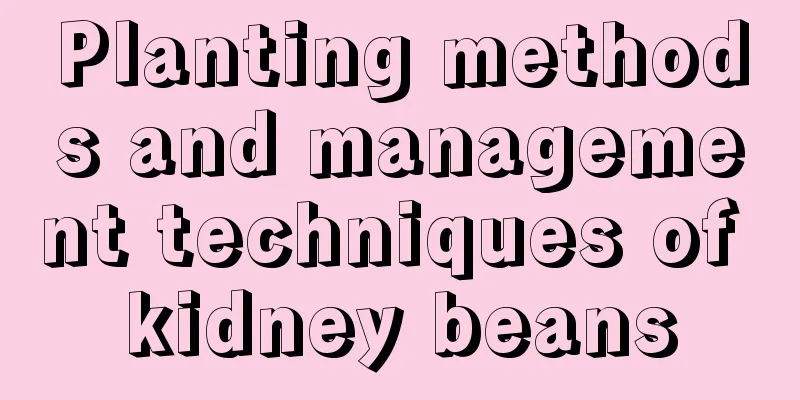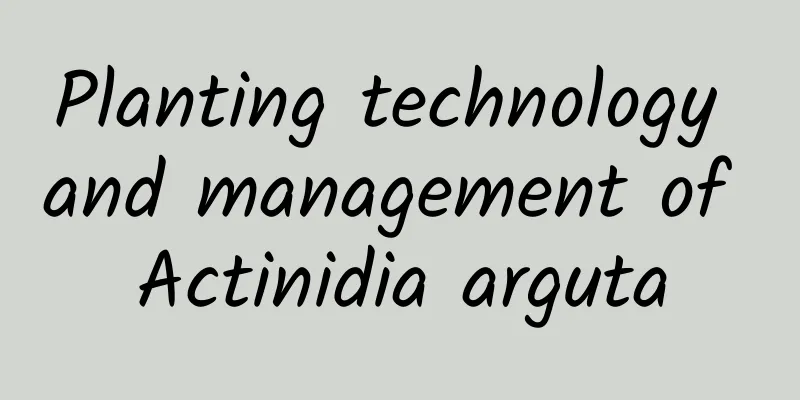Planting methods and management techniques of kidney beans

|
Kidney beans , also known as string beans and green beans , are a very nutritious vegetable . They have strong adaptability to the growing environment and can be grown in most areas. So what are the planting methods and management techniques for kidney beans? Let’s learn more about it below. 1. Site selection and land preparation Kidney beans thrive in well-drained, fertile soil with an ideal pH between 6.0 and 7.5. When preparing the land, deep plow the soil, loosen the soil, and remove weeds and stones to improve soil permeability and water retention. 2. Seed treatment Before sowing kidney beans, the seeds should be placed in the sun for 2-3 days. On the other hand, the seeds should be soaked in 200 times of 50% mancozeb or 0.3% formalin or 0.08% aluminate solution for about 20-30 minutes, then taken out and rinsed repeatedly with clean water for sowing or germination. 3. Key points for sowing Generally, sowing begins when the temperature of the 10 cm soil tillage layer stably exceeds 12°C. Mechanical precision sowing is mostly used, with two rows of seedlings of the Japanese aconite on three ridges, and four rows of seedlings of the Japanese aconite on large ridges on high platforms. The soil is covered evenly. After sowing, the soil is pressed in time according to the soil moisture conditions. The sowing depth after pressing is 3-4 cm. 4. Field management (1) Pay attention to erasing the side buds below the first inflorescence, the flower buds and leaf buds above the first inflorescence, and the leaf buds in the mixed buds; top the side branches in the middle and upper parts after the flower buds appear. (2) When the main vine climbs to the top of the frame, top it in time to stimulate the growth of side vines. Top the side vines again after they appear flower buds. (3) Kidney beans require an appropriate amount of water in the early stages of growth, but irrigation should be reduced during the flowering and podding stages to prevent root diseases. During the growth period, topdressing should be applied in time according to the nutritional status of the plant, especially nitrogen, phosphorus and potassium fertilizers. (4) Kidney beans are easily attacked by pests and diseases during their growth, such as bean borer and aphids. In order to effectively prevent and control diseases and pests, comprehensive prevention measures should be adopted, including physical control, biological control and chemical control. 5. Harvest at the right time Green beans, which are eaten as young pods, can generally be harvested about 8-10 days after flowering. They should be harvested once a day. This can not only ensure the quality and commercial value of the pods, but also reduce the risk of flower and pod drop caused by excessive nutrient consumption of the plants, thereby increasing the pod setting and commercial value rate. The above is an introduction to the planting methods and management techniques of kidney beans. I believe that as long as you master these key points, it is relatively easy to achieve efficient production of kidney beans.
|
<<: Planting methods and management techniques of honeysuckle
>>: Cowpea planting technology and management methods
Recommend
How long is the growth cycle of mango?
Mango growth cycle It usually takes about 3 years...
How to grow Dendrobium odoratum
1. Lighting The scented Dendrobium likes to grow ...
How to grow tiger pineapple well
1. Maintenance methods 1. Temperature: Between 16...
How to sow and propagate miniature coconut
Miniature Coconut Seed Treatment Before sowing mi...
Sprinkle some "fertilizer king" in the soil, you don't have to spend money, and the flowers will grow rapidly!
Add some earthworm manure to the soil and the flo...
Since she started growing these 10 kinds of succulents, the fragrance fills her balcony!
1. Zi Chi Bai Lian The white lotus is also called...
How to prune osmanthus to make it bloom more
1. Prune the dense and weak branches on the branc...
How to grow Phalaenopsis to make it bloom more vigorously (How to grow Phalaenopsis at home)
The correct way for beginners to raise Phalaenops...
Time and method of changing soil in Xianren Mountain
Xianren Mountain soil replacement time When chang...
Why are the leaves of the crabapple tree drying up?
1. Lack of light Reason: Begonia needs sufficient...
What zodiac signs cannot grow money trees? Is it suitable to grow money trees at home?
The meaning of the money tree is quite good, impl...
The cultural form of the spotted tongue orchid
Gentleman among flowers Orchid is one of the four...
How to propagate Bauhinia
Seed propagation Collect mature pods from Septemb...
Where does bougainvillea grow? Where does it like to grow?
Bougainvillea growth habits The flowering time of...
Flower language and legend of straw daisy
The flower language of straw daisy: eternal memor...









